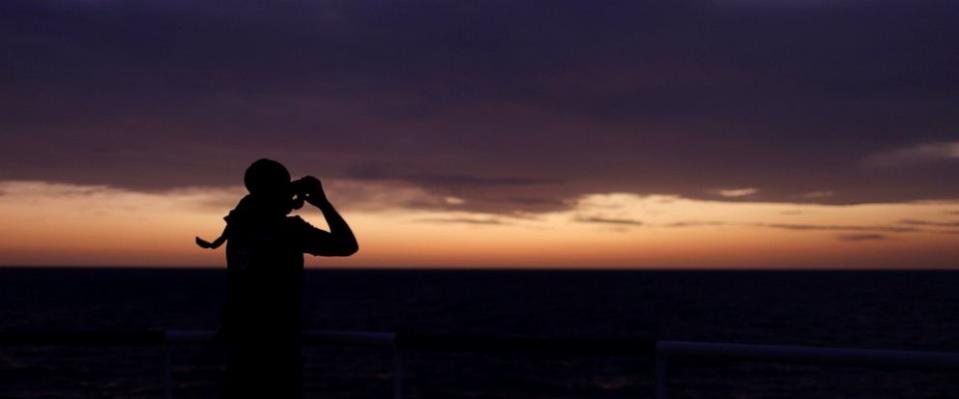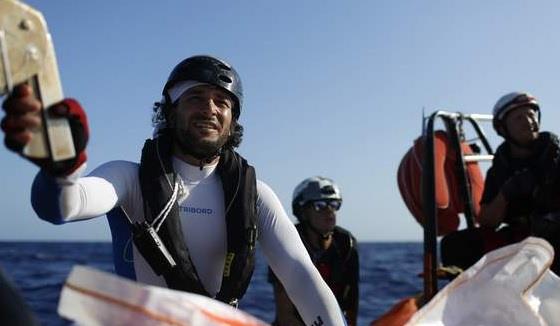Every time Hassan Ali Salem (photo above) pulls a man, woman or child from a rickety boat or straight out of the water, he relives his own trauma in the Mediterranean Sea.
The Egyptian says he was just 16 when he survived a shipwreck in 2004, saved by another migrant who drowned when a packed wooden boat capsized in rough seas before it could reach Italy.
Now 31, Salem is doing the rescuing, trying to help migrants who set off from Libya in flimsy vessels arrive safely in Europe.
"As soon as I touch their skin, I have memories from once upon a time," Salem said. "I say to myself: 'you've finally made it, another Hassan has arrived. He's alive.'"
He is one of 22 people of various nationalities working for humanitarian groups SOS Mediterranee and Doctors Without Borders aboard the Norwegian-flagged Ocean Viking, the biggest charity rescue ship currently operating in the central Mediterranean. The destination: international waters north of Libya where thousands of migrants have drowned in recent years in desperate attempts to reach Europe.
The team is getting ready for a tough assignment.
"People on land have no notion of what we see," said Claire Faggianelli, a 31-year-old boat mechanic from France who has previously worked as a diving instructor and a volunteer lifeguard.

While the activities of the humanitarian groups have sparked heated debate in Europe — critics say they just encourage more migrants to make the perilous crossing from North Africa — people have lost sight of the human tragedy playing out in the Mediterranean, Faggianelli said.
"Don't you realize what is happening? There are people drowning every day," she said.
Italy's decision to end a major rescue operation in 2014 prompted multiple aid organizations to launch their own rescue missions in the central Mediterranean. While their efforts were initially welcomed, they no longer have the sympathy of European governments committed to reducing irregular migration.
Italy and Malta, the two European countries nearest to the rescue zone off Libya, routinely refuse entry to such ships, leading to tense standoffs at sea. In Italy, investigations of aiding illegal immigration have been launched against captains of humanitarian rescue boats, but so far none has been formally charged.
"I'm not going to apologize for saving lives," said Charlie Andreasson, a 54-year-old Swedish sailor with a red beard and a pirate-like bandana.

Andreasson, who has also joined activists attempting to break the Israeli-Egyptian blockade on the Gaza Strip, thought he had done his last Mediterranean rescue mission last year, but said the anti-migrant rhetoric he encountered in his home country made him think again.
"The situation is deteriorating in Europe when it comes to xenophobia and racism," Andreasson said. "So that's why I came back."
Some of the lifeguards, medics, students and sailors aboard the Ocean Viking have put their lives on hold to spend a few weeks or months at sea while others have been jumping from one rescue mission to the next for years.
Strictly speaking, the crew members are not volunteers. While the rescue organizations declined to share compensation details, some said they receive between €1,000 and 2,000 euros ($1,100 and $2,200) a month for their work aboard the ship.
Rescuing is only part of the job. Once safely on the ship, migrants need to be assessed for injuries ranging from fuel burns to torture-related wounds. Women are especially vulnerable and often victims of sexual violence at the hands of human smugglers in Libya.

Doctors Without Borders veteran Mary Jo Frawley began working on rescue ships in 2015. She's seen the smugglers' boats change over the years from large wooden vessels resembling slave ships to the more precarious plastic and duct-taped dinghies being used presently.
The 64-year-old nurse from Vermont said a few years ago hundreds of people from charities and church groups would gather on Italian docks to welcome the rescued. Now the ships are blocked from entering those ports, forcing hundreds of already exhausted migrants to camp out on the deck.
"I believe those people and the hearts are still there waiting for us," Frawley said. "There needs to be a change in how governments are allowing us to go in."
The swearing-in of a new government in Italy may herald a softer approach toward the humanitarian rescue ships, but it's unclear whether any policy shift would take effect in time to affect the current mission of the Ocean Viking. Former Interior Minister Matteo Salvini, a hardliner on migration, regularly lambasted the rescue groups on social media and accused them of collusion with human traffickers, which they strongly denied.
Crew members on the Ocean Viking said they are simply upholding international maritime law, which requires helping people in distress at sea and bringing them to a place of safety. International migration and human rights bodies say Libya is not a place of safety so they should not be returned there.
"The only thing that we do is to rescue them," said Salem, who built a life in Italy after the shipwreck 15 years ago and devoted himself to become a maritime life-saver. "But what matters to me more than the maritime law ... is the human law above all. Regardless of reason, regardless of country of origin, if that person is drowning there, do you ignore them?"